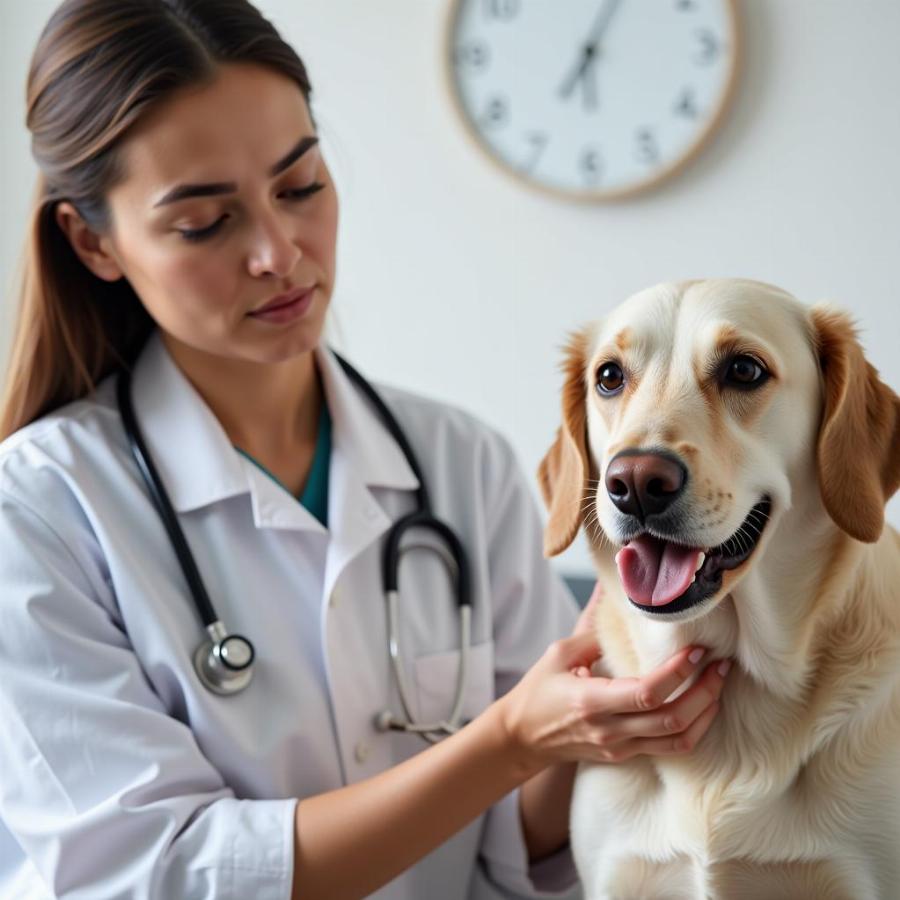As a dog owner, you’re likely well-acquainted with the task of examining your furry friend’s poop. While it might not be the most glamorous part of pet ownership, it’s crucial for monitoring your dog’s health. Changes in color, consistency, and frequency can all signal potential problems. One such change that often raises concern is black dog poop. So, what does black dog poop mean, and should you be worried?
Understanding the Color of Your Dog’s Poop
Dog poop comes in various shades of brown, typically influenced by their diet. However, when it turns black, it often indicates the presence of digested blood in the stool, a condition known as melena. This happens when bleeding occurs in the upper gastrointestinal tract, including the stomach or small intestine.
Common Causes of Black Dog Poop
Several factors can lead to black stool in dogs, ranging from mild to serious. Here are some of the most common culprits:
- Dietary Indiscretion: Has your dog gotten into something they shouldn’t have? Eating a large amount of dark-colored food, like blueberries, or ingesting dirt or other foreign materials can temporarily turn their poop black.
- Medications: Certain medications, like Pepto-Bismol (bismuth subsalicylate) and iron supplements, are known to cause black stool as a side effect. Always consult your veterinarian before giving your dog any medication.
- Ulcers: Stomach and intestinal ulcers can bleed, leading to black, tarry stools. Ulcers can be caused by various factors, including medications, stress, and certain diseases.
- Parasites: Intestinal parasites, like hookworms and roundworms, can cause bleeding in the digestive tract, resulting in black poop. Regular deworming is crucial for preventing and treating these parasites.
- Inflammatory Bowel Disease (IBD): IBD is a chronic condition that causes inflammation in the digestive tract, potentially leading to bleeding and black stool. Other symptoms of IBD may include vomiting, diarrhea, and weight loss.
- Cancer: While less common, tumors in the digestive tract can also bleed and cause black stool.
 Dog Getting Vet Checkup
Dog Getting Vet Checkup
When to Worry and What to Do
If your dog’s poop is black and you notice any of the following symptoms, it’s crucial to contact your veterinarian immediately:
- Lethargy or weakness
- Loss of appetite
- Vomiting
- Diarrhea (especially if bloody)
- Pale gums
- Abdominal pain
When you visit the veterinarian, be prepared to provide a detailed history of your dog’s symptoms, including when you first noticed the black stool, any dietary changes or potential exposures to toxins, and any medications they’re currently taking. Your veterinarian will likely perform a physical examination and may recommend further diagnostic tests, such as:
- Fecal Examination: This test checks for the presence of parasites in your dog’s stool.
- Blood Tests: Blood work can help assess your dog’s overall health and check for signs of infection, anemia, or other underlying conditions.
- X-rays or Ultrasound: These imaging tests can help visualize the digestive tract and identify any abnormalities, such as tumors or blockages.
- Endoscopy: This procedure involves inserting a thin, flexible tube with a camera attached into the esophagus, stomach, and small intestine to visualize these areas and take biopsies if necessary.
Preventing Black Dog Poop
While not all causes of black stool are preventable, there are steps you can take to minimize the risk:
- Feed a Balanced Diet: Provide your dog with a high-quality, balanced diet appropriate for their age, breed, and activity level.
- Avoid Table Scraps: Many human foods can upset a dog’s stomach and lead to digestive issues. Stick to dog food and treats specifically formulated for their needs.
- Secure Hazardous Items: Keep medications, cleaning products, and other potentially toxic substances out of your dog’s reach.
- Regular Veterinary Checkups: Schedule regular checkups with your veterinarian to monitor your dog’s overall health and address any potential issues early on.
Conclusion
Black dog poop can be alarming, but it’s not always a reason to panic. Understanding the potential causes and knowing when to seek veterinary attention is crucial. By being proactive and attentive to your dog’s health, you can help ensure they live a long, happy, and healthy life. Remember, if you’re ever in doubt, it’s always best to err on the side of caution and consult your veterinarian.
FAQs
1. Can stress cause black poop in dogs?
While stress itself doesn’t directly cause black poop, it can contribute to digestive upset and conditions like ulcers, which can lead to bleeding in the digestive tract.
2. My dog’s poop is dark brown, almost black. Should I be concerned?
It’s important to differentiate between dark brown poop and true black poop. Dark brown poop can be normal, especially if your dog has recently eaten dark-colored food. However, if you’re unsure, it’s always best to consult your veterinarian.
3. My dog had black poop once, but it’s back to normal now. Do I still need to see the vet?
Even if the black stool resolves on its own, it’s still a good idea to contact your veterinarian. They can help determine if any underlying issues need to be addressed and provide guidance on monitoring your dog’s health moving forward.
4. Can dehydration cause black dog poop?
Dehydration itself doesn’t typically cause black poop. However, it can lead to constipation, which might result in darker, harder stools.
5. My dog is on medication and has black poop. What should I do?
Contact your veterinarian immediately. Certain medications can cause black stool as a side effect, and your vet can advise you on how to proceed.
Looking for More Information?
Check out these helpful articles on Beaut Dogs:
Beaut Dogs is your trusted source for all things dog-related. We provide comprehensive and reliable information to help you care for your furry companion. If you need further assistance, please don’t hesitate to reach out to us at [email protected] for detailed and accurate answers to your questions.